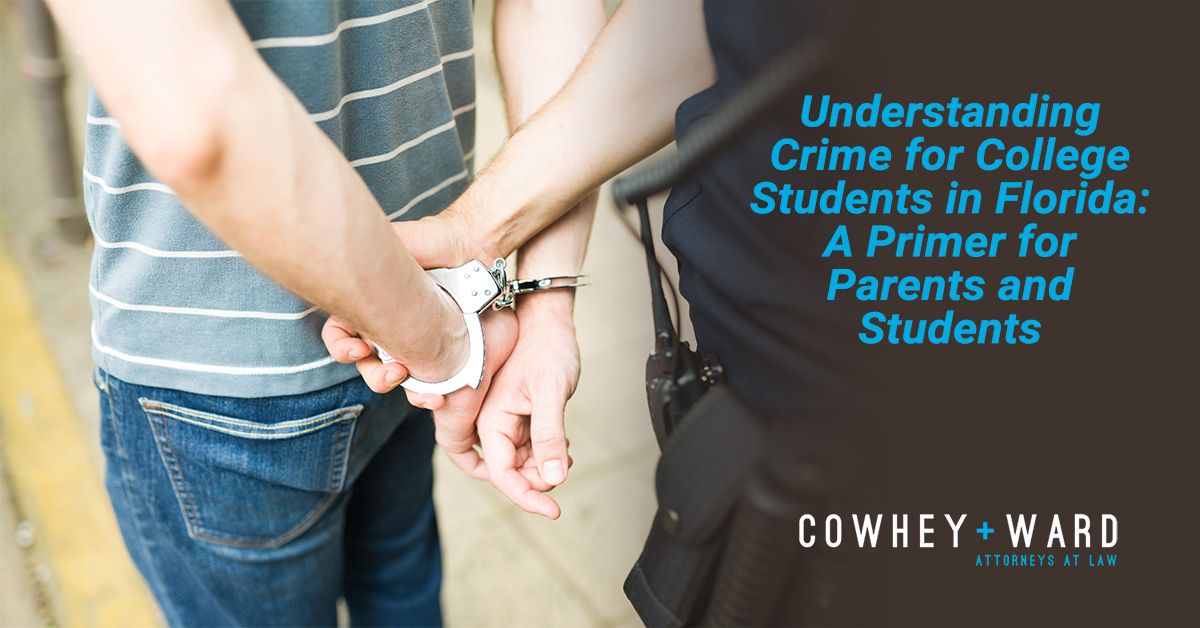Understanding Crime for College Students in Florida: A Primer for Parents and Students

Earning a postsecondary degree from a college or university is challenging but worth the effort due to the enhanced employment opportunities a diploma typically provides. However, the challenges are such that more than one million students drop out of four-year and community college annually. Financial difficulties play a leading role in postsecondary education drop-out rates, but other factors can prove influential as well.
While not a significant cause of students dropping out of college, crime can end a student’s educational aspirations. Trauma often causes victims of violent and sexual crimes to cease their studies, and victims who suffer financial losses from an offense may no longer be able to afford their education. On the other hand, students accused of criminal acts also jeopardize their pursuit of a college degree, even with some apparently low-level offenses.
With experience defending college students who’ve been arrested for criminal offenses, Tallahassee’s Cowhey + Ward, LLC knows how disruptive such charges can be to a student’s education. To help students and parents better understand campus crime and how a student’s arrest for a criminal offense can jeopardize their postsecondary education goals, we’ve put together the following primer.
Prevalence of Campus Crime
With more than 18 million students enrolled in the country’s universities, colleges, and community colleges, campuses tend to be safe, with crime rates generally below national, state, and municipal averages. According to U.S. Department of Education Campus Safety and Security data, postsecondary institutions reported 31,137 criminal offenses in 2021, of which 42% qualified as Violence Against Woman Act offenses. Other commonly reported campus criminal offenses included burglaries, motor vehicle theft, and aggravated assault.
Schools reported 21,816 campus arrests for criminal offenses (though not all may be students) that year, and 130,911 students were subjected to school disciplinary action. Of the arrests and disciplinary actions, the vast majority were related to alcohol and illegal drug violations. The data indicates that the number of campus-reported criminal offenses has declined by 53% since 2005, while the number of arrests decreased by about 72%.
Looking closer to home by examining Clery Act crime reporting data from Tallahassee’s Florida State University, 82 criminal offenses were reported on campus in 2021. Of these, 31 were sexual assaults, 19 motor vehicle thefts, nine burglaries, six robberies, and four aggravated assaults. Campus police arrested 57 students for drug offenses, 28 for liquor law violations, and seven on weapons charges. Almost 250 students were referred for disciplinary action for alcohol violations. The arrest numbers do not include students who may have been arrested for crimes committed off campus.
Common Criminal Charges Students Face
Based on research, anecdotal evidence, and our own experience, postsecondary education students seem to be most at risk of facing charges for the following offenses:
- Alcohol law violations
- Driving under the influence
- Drug possession
- Vandalism
- Theft
- Sexual-related offenses
Impacts an Arrest and Conviction Can Have on Students
While most college student arrests involve relatively minor offenses, even arrests and subsequent convictions on lower-level misdemeanor charges can significantly impact a student’s college attendance. Court attendance, potential jail time, probation, and mandated community service can cause students to miss important classes, while fines can create economic difficulties. Missed classes and potential emotional turmoil can affect a student’s grades, which might jeopardize scholarship funds and/or academic eligibility.
Felony charges represent a much more significant threat to a student’s future educational goals in both the near and long term. Depending on the charges, bail conditions might limit a student’s ability to secure pre-trial release, which would prevent them from attending classes. Many felony convictions carry jail and prison sentences that would make it impossible for a student to continue their studies, whether for a semester or years. Additionally, incarceration limits the eligibility of student access to federal student loans.
In some cases, the line between what constitutes a misdemeanor versus a felony is thin. For example, what might seem to be a misdemeanor theft could be elevated to felony theft if the value of the stolen item(s) exceeds $750. Most alcohol-related crimes are misdemeanors, but some college students are shocked to discover that possession of some types of fake IDs can generate a felony charge. What a student might think constitutes simple possession of a drug, could be elevated to felony trafficking charges if amounts exceed specific thresholds.
School-Based Sanctions for Criminal Charges
Because many criminal acts are also considered violations of a school’s student code of conduct, on-campus arrests can lead to an administrative hearing that can result in expulsion, suspension, referral to counseling, or other sanctions. Students arrested for off-campus offenses can also be subject to such administrative hearings if the school finds out about it. In most cases, students have the right to attend such hearings with an advisor, which includes legal representation by a lawyer.
Consult with Cowhey + Ward for Student Crime Expertise
The criminal defense attorneys at Cowhey + Ward have successfully defended many Tallahassee-area postsecondary education students against criminal charges. Cowhey + Ward lawyers can review the details of your case to strategize a defense designed to secure the best outcome possible and keep you in school. We can also help prepare you for any related school administrative hearings and advise you during the process.
To learn how Cowhey + Ward can help defend you from student-crime-related charges, contact our Tallahassee-based office today at (850) 222-1000.
Accessibility Statement
Our firm is committed to keeping our site accessible to everyone. We welcome feedback on ways to improve the site’s accessibility.
